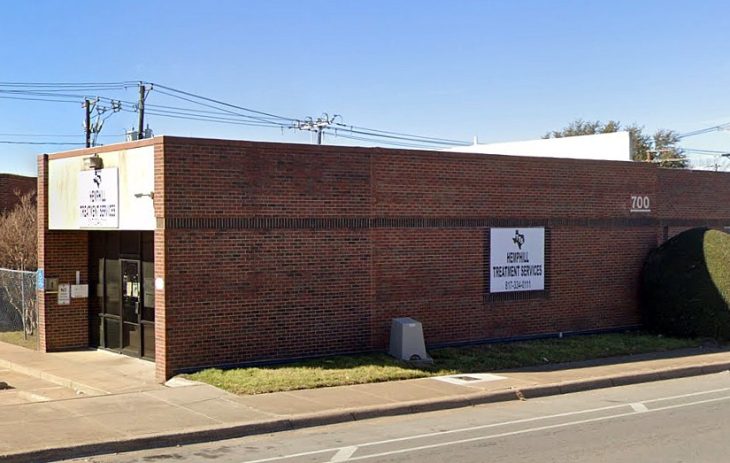About Hemphill Treatment Services
Hemphill Treatment Services is a CARF-accredited opioid addiction treatment center serving adults in the Southside neighborhood of Fort Worth and throughout Tarrant County, Texas. It’s nestled on Hemphill Street in Fort Worth, next to the Gas Station and just a mile north of the Fairmount–Southside Historic District. The care at this facility is built around medication-assisted treatment (MAT) and long-term healing.
I especially appreciate their ability to keep care affordable without ever compromising on quality. By accepting Medicaid, Medicare and Medicare Advantage plans, they make opioid treatment accessible to a broad range of individuals who might otherwise face barriers to care.
Their steadfast support, compassionate care and effective therapeutic interventions have earned the trust of many individuals on their path to recovery. This is evident in their near-perfect 4.8-star rating and the overwhelming gratitude expressed by many former clients. One noted, “If you struggle with addiction and need help to get clean. This is where you should go. Everyone here is gracious helpful and patient…”
Medication-Supported Recovery With Methadone
Medication-assisted treatment (MAT) is a science-backed technique that supports long-term abstinence by combining behavioral therapy and FDA-approved medication. At Hemphill Treatment Services, methadone is prescribed as part of your personalized recovery plan after a thorough intake assessment.
This medication helps reduce cravings and withdrawal symptoms, making recovery more manageable. Through regular therapeutic engagement, you’ll gain tools to manage triggers and develop robust strategies for relapse prevention necessary for maintaining long-term sobriety.
Expert Care For Diverse Populations
The clinic boasts a team of genuinely kind, experienced and knowledgeable professionals dedicated to walking beside each person on their journey toward healing and hope. These experts foster a welcoming, nurturing, and nonjudgmental space that supports everyone, regardless of sex, gender identity or sexual orientation and background.
LGBTQ+ individuals, people living with HIV/AIDS, those navigating legal challenges and anyone truly seeking a fresh start are treated with the individualized care they deserve. They even provide dedicated support for pregnant and postpartum women, with a focus on promoting healthy outcomes for both mother and child.
Levels of Care
-
Outpatient
In outpatient therapy, you’ll attend therapy sessions several times each week while living at home. This is ideal if you have a strong support system and a lower risk of relapse. Outpatient treatment offers flexibility to maintain work, school or family obligations.
-
Aftercare
Aftercare programs provide ongoing support after you complete a rehab program. They may include several components to help you maintain sobriety including therapy, community support groups and relapse prevention strategies. This gives you a network of resources as you reintegrate into your daily life.
-
Dual Diagnosis
Dual diagnosis programs address substance use disorders and co-occurring mental health conditions simultaneously. This integrated approach to care improves the likelihood of long term recovery and stability by addressing the root causes of addiction.
Detox Service Setting
-
Outpatient Detox
Outpatient detox gives you access to medically supervised withdrawal services while still allowing you to live at home. You’ll attend a clinic for treatment and monitoring. This flexible option is suitable for those with mild to moderate withdrawal symptoms who have strong support systems.
Programs
-
Adult (18+)
Adult programs address the substance use and life challenges specific to adults. Therapists can deliver sessions in individual, group and family settings. Services often include job support and life skills training in a structured environment.
-
Alcohol Detox
Alcohol detox programs offer medical support to help individuals withdraw safely from alcohol. Your care team may use medications to ease your symptoms and provide medical monitoring to address complications.
-
Cognitive Behavioral Therapy
Cognitive behavioral therapy focuses on changing harmful thought patterns and behaviors associated with addiction. You’ll learn healthier coping mechanisms by identifying and replacing negative thoughts. This improves your emotional resilience and decreases your relapse potential.
-
Men
Men's programs address substance use while also considering the social pressures, family roles and mental health concerns that are specific to men. You’ll learn healthy coping mechanisms as you build emotional resilience and develop communication skills.
-
Opioid Detox
Opioid detox uses medications to ease severe withdrawal symptoms. It also includes medical supervision to help you manage potential complications. These services allow you to stabilize and begin a recovery plan.
-
Women
Women's programs offer a safe and supportive space to focus on gender specific issues such as trauma, family roles and mental health conditions. Therapists tailor the sessions to address women's needs and foster empowerment in a healing and nurturing environment.
-
Young Adult (18 - 25)
Young adult programs are designed for individuals who are transitioning into adulthood. Topics of discussion typically include identity, independence and peer relationships. Providers may also offer life skills training and career support.
Accreditations
-
 SAMHSA
SAMHSA
Amenities
- Private Transportation
Contact
700 Hemphill Street Suite A
Fort Worth, TX 76104





